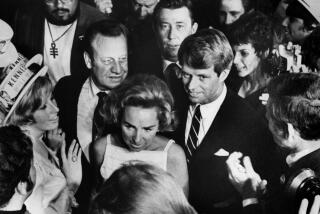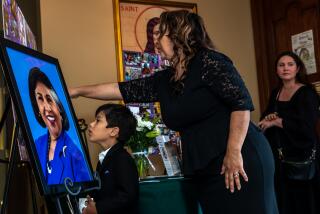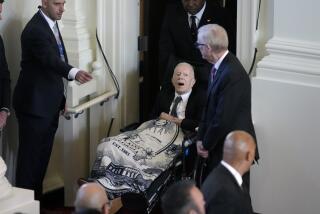Dignity Shaped In the Glare of Tragedy : An unwilling public icon, Jacqueline Kennedy Onassis hewed always to her own path
- Share via
Jacqueline Kennedy Onassis is dead, and the grief that Americans feel is not just a grief for her and her family. What she stood for is something Americans obscurely yearn for. The word for it--more than taste or even grace--is dignity.
No American old enough to remember the day will ever forget her ravaged nobility at the funeral of her husband, the slain President John F. Kennedy. Virtually the entire nation saw her whisper to her 3-year-old son that the moment had come for him to salute. But that was not the only part of the ceremony touched by her sense of bravery and decorum. The assassination in Dallas had been a scene not just of horror but also of squalor. In Washington, mere days later, she helped shape a public liturgy that turned a hideous trauma into a healing catharsis.
But a woman’s dignity is defined by more than a husband’s death. “I am the man who accompanied Jacqueline Kennedy to Paris,” Jack Kennedy quipped after a triumphant state visit.
She was a mother as well as a wife, the mother of two children, Caroline and John Jr. Her infant son Patrick, born in 1963, lived just two days. Can any moment in a woman’s life cry out for privacy more loudly than that one? It was then, perhaps, that she began learning how to secure the minimum of privacy that dignity requires.
When her remarriage, to Greek shipping magnate Aristotle Onassis, was announced, many Americans were in shock. Was she marrying for money? To a point she was, but financing her famous wardrobe played a smaller role in her decision than financing elaborate security arrangements that she herself could not afford. Eventually the world agreed to call her Jacqueline Onassis.
Widowed again, she made a private life but not a life that made a fetish of privacy. True, in the 30 years since JFK’s assassination she never gave an interview, but she appeared often in public. She sometimes fled her celebrity, but she refused to be ruled by it. As an editor at Doubleday, she pursued her own eclectic tastes in the authors she chose, Nobel prize-winning Egyptian novelist Naguib Mahfouz and dancer and choreographer Twyla Tharp among them. These were not interests developed to make a husband look good or tend a public image. They were hers.
She never sought to be a role model or a public servant. She was, in her way, like a conscript who becomes a war hero and public icon. Her achievement, past a certain point, is a quiet defense of the human being who was there before history staged its kidnaping and the legend began. In a simple but compelling way, she knew who she was. At a time when her country is insecure in its identity and uncertain in its taste, her passing leaves a sorrow touched with wonder.


